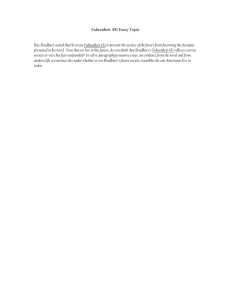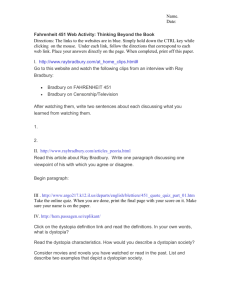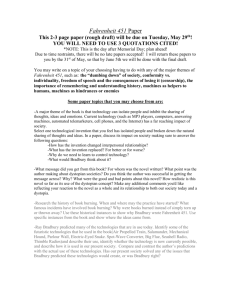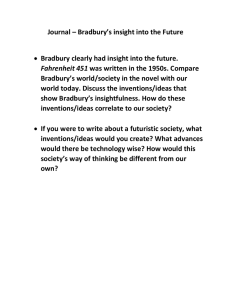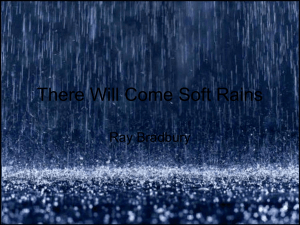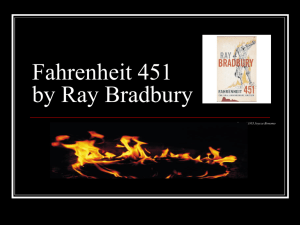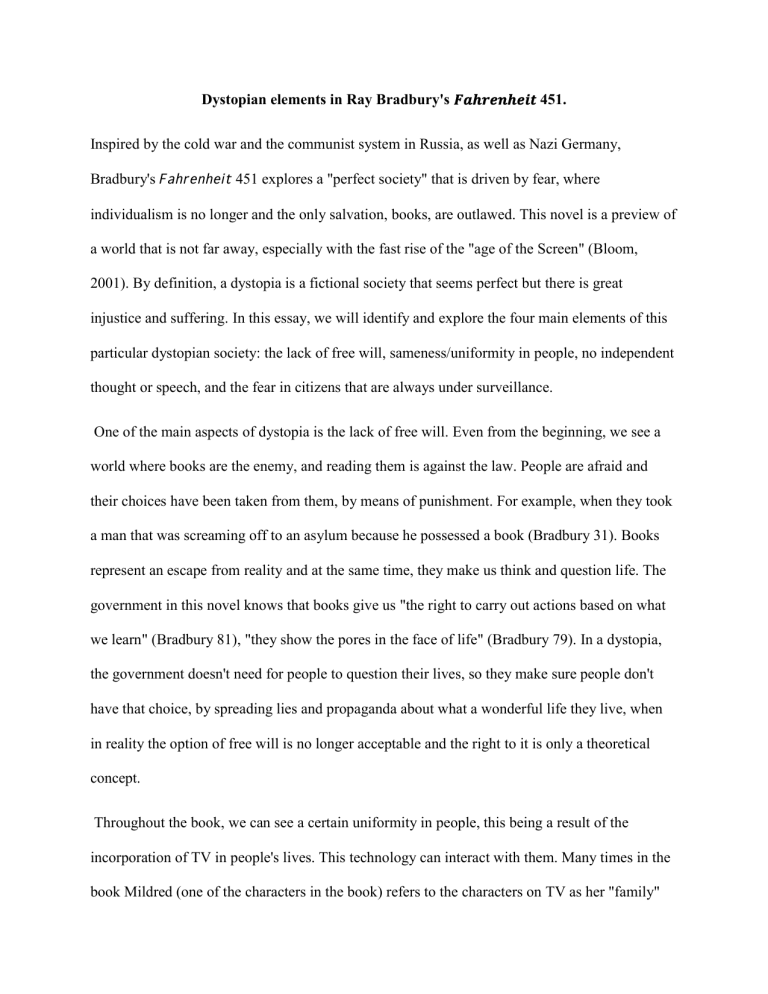
Dystopian elements in Ray Bradbury's 𝑭𝒂𝒉𝒓𝒆𝒏𝒉𝒆𝒊𝒕 451. Inspired by the cold war and the communist system in Russia, as well as Nazi Germany, Bradbury's 𝘍𝘢𝘩𝘳𝘦𝘯𝘩𝘦𝘪𝘵 451 explores a "perfect society" that is driven by fear, where individualism is no longer and the only salvation, books, are outlawed. This novel is a preview of a world that is not far away, especially with the fast rise of the "age of the Screen" (Bloom, 2001). By definition, a dystopia is a fictional society that seems perfect but there is great injustice and suffering. In this essay, we will identify and explore the four main elements of this particular dystopian society: the lack of free will, sameness/uniformity in people, no independent thought or speech, and the fear in citizens that are always under surveillance. One of the main aspects of dystopia is the lack of free will. Even from the beginning, we see a world where books are the enemy, and reading them is against the law. People are afraid and their choices have been taken from them, by means of punishment. For example, when they took a man that was screaming off to an asylum because he possessed a book (Bradbury 31). Books represent an escape from reality and at the same time, they make us think and question life. The government in this novel knows that books give us "the right to carry out actions based on what we learn" (Bradbury 81), "they show the pores in the face of life" (Bradbury 79). In a dystopia, the government doesn't need for people to question their lives, so they make sure people don't have that choice, by spreading lies and propaganda about what a wonderful life they live, when in reality the option of free will is no longer acceptable and the right to it is only a theoretical concept. Throughout the book, we can see a certain uniformity in people, this being a result of the incorporation of TV in people's lives. This technology can interact with them. Many times in the book Mildred (one of the characters in the book) refers to the characters on TV as her "family" believing that only the "family" is "people" and dismisses books as being real (Bradbury 80). In the novel, Captain Beatty (one of the characters in the book) said that once, books appealed to a few people and that they could afford to be different and the world was roomy, but then the world got full of eyes and elbows and mouths (Bradbury 51). In this situation he tries to convince Guy (the protagonist) that the extinction of books is necessary so that everyone is happy, thinking that only a world where everyone is equal can be a "perfect" one, arguing that "We must all be alike. Not everyone born free and equal, as the Constitution says, but everyone made equal. Each man the image of every other; then all are happy" (Bradbury 55). This kind of idea and thinking is meant to control the crowd. In her article, Hannah Weber says that "The people who make up Bradbury's society become less observant and individual, and are generic to the point that they only exist as part of the general collective "society". Everything that they think of or do must be physical and concrete; their ability to abstract, philosophize or even think creatively is completely erased." (Weber, 2012) The goal of every dystopian society is to take independent thought and speech from people. This again is the result of TV that gives them no reason to think and gets them further from books. We can see that the education system wants to create a society that doesn't think, they just have TV classes and then sports, and arts that don't require thinking and then more TV classes, and this system only makes "us so ragged by the end of the day we can't do anything but go to bed or head for a Fun Park to bully people around" (Bradbury 27). This is why books are so important, they feed the mind and give pleasure to the soul. While referring to this novel, Margaret Atwood said that "The very act of reading is considered detrimental to social order because it causes people to think and then to distrust authorities" (Atwood, 2013). The worst thing that can happen to a society is for it to blindly follow the authority. This would result in a long-lasting dystopian world. Bradbury's world is a place where citizens are always under surveillance. They turn their "friends" in for possessing books and those who can actually make a difference live in fear, because "So many people are. Afraid of firemen, I mean."(Bradbury 5). The author introduces the authority that keeps this fear intact as the "firemen" and the "The Mechanical Hound" which only knows how to hunt and find and kill (Bradbury 25). Gilbert Highet argues that the danger is not that the X group wants to burn the Y group and vice versa, not even that a dictator wants to keep all people ignorant, but that, someday we may reach the stage of hating literature because it is an effort. All of this is presented in a series of clearly described, superbly imagined pictures, part of a terrifying, yet hopeful plot: the Mechanical Hound following silently, the City ascending into air… (Highet, 1953). In conclusion, I can say that this novel presents a typical dystopian world. In this essay, we explored four main characteristics of dystopia and how they fit into Bradbury's fictional society. First of all, we have the lack of free will which usually is portrayed as people having choices that are within the limits of the government's ideology. Second of all, there is the sameness in people that is greatly influenced by the TV and the idea that everyone needs to be made equal in order to be happy. Thirdly and maybe the most important is the loss of independent thought and speech that will grant the dystopian society a sure triumph. Last but not least is the constant surveillance of the society that inspires fear and obedience to the government. Together all of this creates an exciting story about a truly dystopian world, as Bradbury once said "You don't have to burn books to destroy a culture. Just get people to stop reading them"(Bradbury). Bibliography Atwood, M. (2013). Fahrenheit 451. In R. Bradbury, Fahrenheit 451 (p. 236-237). New York: Simon & Schuster Paperbacks. Bloom, H. (2001). Introduction to Ray Bradbury's Fahrenheit 451. In R. Bradbury, Fahrenheit 451 (p. 234-135). New York: Simon & Schuster Paperbacks. Bradbury, R. (2013). Fahrenheit 451. New York: Simon & Schuster Paperbacks. Highet, G. (1953). New wine, old bottles. Harper's Magazine. Weber, H. A. (2012). Literature as a Social Tool: Education and Cohesion or Class Domination? Inquiries Journal. http://www.inquiriesjournal.com/articles/606/literature-as-a-social-tool-education-and-cohesionor-class-domination. Accessed 29 May 2021.

